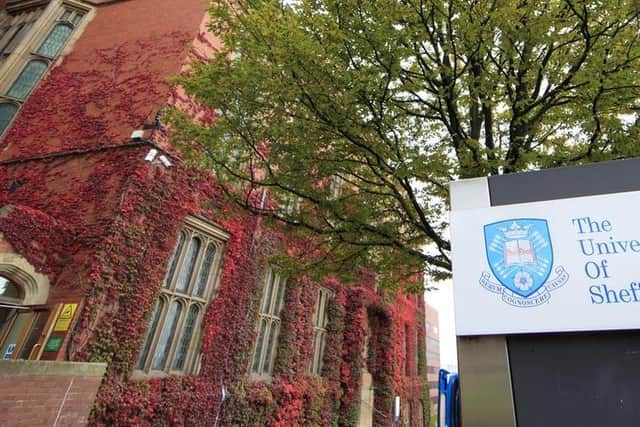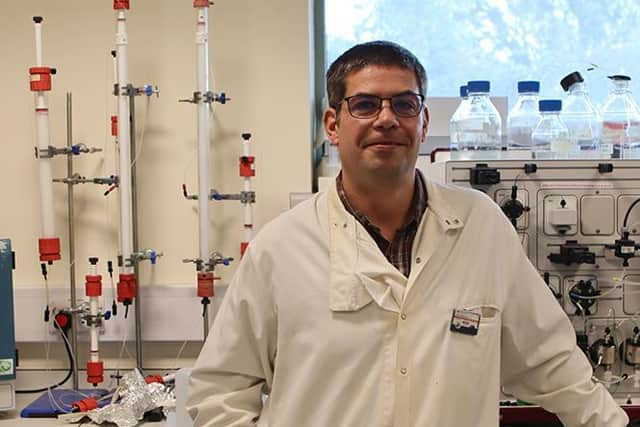Yorkshire university in pioneering treatment for motor neurone disease and frontotemporal dementia
A research team at the University of Sheffield’s Institute for Translational Neuroscience (SITraN) has been awarded the grant by LifeArc and the Motor Neurone Disease Association to pioneer new treatments for neuro-degenerative diseases.
The funding of £513,141 will be used to advance the development of an ambitious gene therapy programme to treat motor neurone disease (MND) and frontotemporal dementia (FTD) patients with underlying mutations in a causative gene known as C9orf72.


Advertisement
Hide AdAdvertisement
Hide AdResearchers say this programme could lead ground breaking research into future clinical trials for one of the most common forms of these incurable neurodegenerative diseases within the next few years.
Dr Guillaume Hautbergue, the research lead from the University of Sheffield, said: "This is a completely new approach to tackling the most common type of motor neurone disease.
"No one has yet attempted to prevent these repeated sequences of RNA from leaving the cell’s nucleus and it opens up new areas of investigation for gene therapy.
"It is an exciting time for biomedical research and the development of novel treatments for incurable diseases such as MND."


Advertisement
Hide AdAdvertisement
Hide AdMND, which is also known as Amyotrophic Lateral Sclerosis, affects about 5,000 people in the UK and 30,000 people in the USA, with numbers predicted to rise.
It is a disorder that affects the nerves – or motor neurons –in the brain and spinal cord that form the connection between the nervous system and muscles to enable movement of the body.
The messages from these nerves gradually stop reaching the muscles, leading them to weaken, stiffen and eventually waste away.
Patients with MND include the former England and Leeds Rhinos rugby league player Rob Burrow, who played 493 games in a 16-year career with the West Yorkshire club, who announced in December 2019 that he had been diagnosed with MND.


Advertisement
Hide AdAdvertisement
Hide AdThere is currently no cure for MND and no effective treatments to halt or reverse the progression of the devastating disease.
FTD is a rare form of dementia that usually begins between ages 45 and 65. It affects the front and side (temporal) areas of the brain, leading to behavior changes and difficulty with speaking and thinking.
Like other types of dementia, frontotemporal dementia tends to develop slowly and get gradually worse over several years.
There is currently no cure for FTD but there are treatments that can help manage some of the symptoms.
Advertisement
Hide AdAdvertisement
Hide AdBut in an early stage study Dr Hautbergue and his research team were able to pinpoint why the repeated RNA sequences - a technique which uses next-generation sequencing to reveal the presence and quantity of RNA in a biological sample - are able to leave the cell’s nucleus to cause cell death.
The team identified a particular protein called SRSF1 which binds to the pathological repeated RNA molecules and transports them out of the cell centre.
The researchers also found that by reducing the SRSF1 protein or altering its makeup so that it is unable to interact with the cell’s export machinery, it is possible to reduce the amount of rogue RNA molecules escaping into the cell’s cytoplasm.
The next step for the team of researchers is to work alongside the organisation Cell and Gene Therapy Catapult - to develop the gene therapy further.
Advertisement
Hide AdAdvertisement
Hide AdMatthew Durdy, the chief executive officer, for Cell and Gene Therapy Catapult, said: “The progress of this scientific breakthrough from the University of Sheffield... is testament to the UK research excellence and favourable ecosystem for cell and gene therapies."
Dr Brian Dickie, the director of research development, for the MND Association, said: "Gene therapy for neurodegenerative diseases, such as MND, has had its ups and downs over the past two decades, but the field is now enjoying a renaissance.
"There is a clear route to clinical trials if the outcomes of this new study are positive."
Dr Melanie Lee CBE, Chief Executive Officer of LifeArc, added: "This gene therapy approach, focused on preventing motor neurone toxicity, is the latest in a series of initiatives we are proud to be part of to drive research into practical treatments for this fatal and brutal condition."
Advertisement
Hide AdAdvertisement
Hide AdEarlier this year the University of Sheffield launched the Gene Therapy Innovation and Manufacturing Centre (GTIMC) - one of three pioneering hubs in a new £18m network funded by LifeArc and the Medical Research Council (MRC) with support from the Biotechnology and Biological Sciences Research Council (BBSRC).
__________
Support The Yorkshire Post and become a subscriber today.
Your subscription will help us to continue to bring quality news to the people of Yorkshire. In return, you'll see fewer ads on site, get free access to our app and receive exclusive members-only offers. Click here to subscribe.
Comment Guidelines
National World encourages reader discussion on our stories. User feedback, insights and back-and-forth exchanges add a rich layer of context to reporting. Please review our Community Guidelines before commenting.
